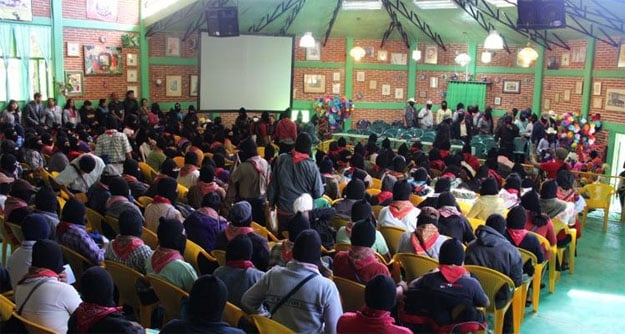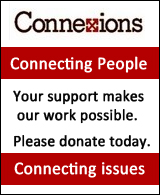Other Voices: The Connexions Newsletter
May 2, 2017
This Issue: Affirming Life, Resisting War, Reporting UFOs
What do we do when those in power recklessly put the future of the entire planet at risk with their acts of aggression and military provocations, while they ignore the growing disaster of climate change?
We fight back and organize, on every level, wherever we are, doing whatever offers the hope of resisting and of building a movement that can stop and overturn the out-of-control monster of late capitalism.
In this issue, you’ll learn about workers, peasants, scientists and Zapatistas meeting to explore ways of ensuring that science is guided by ethics, social responsibility, and human needs. You’ll read about how indigenous women, who often experience the first and worst effects of climate change, struggle to protect their environments. In the People’s History section, you’ll find a story about the Quechua people and their centuries-long project of developing and protecting more than 2,000 varieties of potato: a heritage that is a gift to the entire world, more important than ever in the face of climate change.
We travel back to look at the historical background of the current tensions in Korea, a background that includes a long history of American attacks on, and threats against, North Korea, with the predictable result that North Korea’s leadership feels it has to deter another U.S. attack at all costs.
UFOs are not normally a topic that receives much attention in Other Voices, but in this issue we draw attention to a flood of phone calls to the hotline set up by the U.S. government for reporting illegal aliens. It seems they have been getting so many phone calls reporting UFO abductions, and describing Star Trek episodes in great detail, that the hotline (1-855-48-VOICE) is essentially out of service. Oh dear!
Our topic of the week is Militarism and Democracy. Or, more precisely, the irreconcilable conflict between militarism versus the possibility of having a real democracy.
As always, we invite you to share this newsletter with your friends. You can forward this email, or send them the link to the Other Voices home page on the Connexions website at www.connexions.org/Media/CxNewsletter.htm.
If you'd like to subscribe and receive this newsletter by email every two weeks, please use this form.
Your feedback is appreciated - and so are donations to keep us doing what we're doing!

Topic of the Week
Militarism and Democracy
The increasing growth of militarism – including the militarization of the police – has inevitably been accompanied by a progressive erosion of what remains of the democratic rights that are supposed to belong to citizens of those states that claim to be democracies. The Connexions Library features a wide range of articles, books, and films on the relationship between democracy and militarism, from Rosa Luxemburg’s prophetic writings about militarism before the first World War, to current analyses of the military recklessness of the Trump administration. Explore them here
This Week on Connexions.org
Zapatistas urge scientists to join in building a better world
The Ejército Zapatista de Liberación Nacional (EZLN, Zapatista National Liberation Army, commonly called the Zapatistas) recently held a 10-day educational conference which brought together members of the EZLN, scientists from 11 countries, and working people and peasants from the Chiapas region to discuss a range of scientific topics and to consider the role of science and scientists in the fight against oppression and poverty. A central question they asked was, faced with all the damage that the capitalists have done to the people through their misuse of science, can we create a science that is truly human? Can we work collectively to defend life and humanity? Read more
Keywords: Science - Science & Society
Indigenous Women: The Frontline Protectors of the Environment
Indigenous women, who experience the first and worst effects of climate change globally, are often in the frontline of struggles to protect the environment. Their struggles are not only against ‘old’ economy of extraction and pollution, but the ‘new economy’ of‘carbon trading’ and ‘clean energy’ projects, which are often placed on indigenous people’s lands without their consent. Read more
Keywords: Indigenous Women - Women's Issues/Environment
Endless Atrocities: The US Role In Creating The North Korean Fortress-State
This overview of the history that informs North Korea's relations with the United States examines how the long history of American attacks on, and threats against, North Korea, have hardened that country’s determination not to submit to American dictates. Read more
Keywords: Korea - North Korea
Trump's Hotline for "Criminal Aliens" Flooded with Reports of UFOs
The U.S. Department of Homeland Security (DHS) has unveiled its controversial hotline for U.S. citizens to report alleged crimes committed by undocumented aliens. The hotline has been promptly overwhelmed with calls about extraterrestrials and UFOs. One of those who called the hotline, Marine Corps veteran and journalist Alexander McCoy, said that he had called to report that he had been abducted by a UFO. Commented McCoy, "I think it's powerful to see the response there's been. I think there are a lot of people who have been searching for something they can do to speak out, and I'm glad that so many people are showing solidarity with the immigrant community."
"Wouldn't it be a shame," McCoy said, "if millions of people called this hotline to report their encounters with aliens of the UFO-variety."
The number is 1-855-48-VOICE.
Keywords: Alien Abduction - Anti-Immigrant
A Heartfelt Apology to Ha’aretz Readers
Ha’aretz columnist Gideon Levy offers an apology to readers who complained about his ‘one-sidedness.’
“Allow me to apologize,” writes Levy. “To apologize for writing the truth all these years. I should have taken into account that this truth wasn’t palatable to you, and acted accordingly.... I apologize for the one-sidedness. How could I not maintain a balance
between the murderer and the murdered; the thief and his victim; and the occupier and the occupied?” Read more
Keywords: Israeli Apartheid - Palestine/Occupation
Website of the Week
Inter Press Service (IPS)
IPS was founded in 1964 with the goal of "giving a voice to the voiceless" -- acting as a communication channel that privileges the voices and the concerns of the poorestIPS believes that information is an agent of change and precondition for lifting communities out of poverty and marginalization.
IPS's work includes:
* Providing news and content: producing stories and analyses, which explain how events and global processes affect individuals and communities, especially the marginalised and voiceless.
* Capacity-building: empowering journalists, media organisations and civil society to be better able to communicate effectively by leveraging IPS’ character as a Southern-focused news agency, offering a different kind of training and follow-up.
* Dissemination and networking: building an information bridge linking civil society, international institutions, policy-makers, donors and individual readers, to promote an ongoing dialogue about communication and development for a better world.
Find IPS here
Keywords: Alternative Media - Progressive News Sources
Book of the Week
Reading Revolution: Shakespeare on Robben Island
By Ashwin Desai
The prison authorities on apartheid South Africa's Robben Island strictly censored the reading materials inmates received from the outside world. Yet, the prisoners cleverly managed to smuggle political literature disguised as religious texts, into their communal cells. The works of Shakespeare resonated most deeply among the inmates for their anti-colonial and anti-apartheid inspirations, as well as for the power and beauty of the words. Through memories and biographical accounts written by former political inmates including Nelson Mandela, Reading Revolution evocatively depicts the power of these great works. We see how words can inspire the human spirit, light up the intellect, and free the reader to travel the world. The book, with nearly fifty pages of four-color illustrations, ignites once more, a reading revolution, to stir up the imagination.
"Somehow, Shakespeare always seems to have something to say to us." -Nelson Mandela
Keywords: Political Prisoners - Reading
Film of the Week
Snowden
A portrait of Edward Snowden, the whistleblower who became increasingly disturbed by the U.S. security agencies’ secret and illegal surveillance of hundreds of millions of people. A gripping, thoughtful, complex portrait of a man who risked everything to do what he believed he had to do. Find out more
Edward Snowden is on Twitter - Find him at @Snowden
Keywords: National Security - Surveillance
Organizing
Checking out
An account, by a prisoner, of a workplace rebellion by prisoners in the notorious Rikers Island correctional facility. The result was chaos for a hated overseer, and the sweet aftertaste of an assertion of people power all too rare in their line of work. Read more
Keywords: Prisoners - Workplace Conflict
People's History
The guardians of the Andean potato
More than 2,800 types of potatoes are known to have originated in Peru. The existence of these varieties can be attributed to the high value the Quechua people place on their cultural traditions and biological diversity. Now they are striving to ensure the potato’s survival in the face of climate change. Read more
Keywords: Potato - Plants & Indigenous People
From the Archives
Marx and Engels and the Red Chemist
New studies of Marx’s long-unavailable notebooks, now being published in the massive Marx-Engels Complete Works cast new light on the development of Marx’s ideas and his detailed plans for the books that he was unable to finish before his death. One important influence on both Marx and Engels was Carl Schorlemmer, a chemist and a communist, who helped them to understand the latest developments in the natural sciences. Both Marx and Engels were keenly interested in science and natural history. Read more
Keywords: History and Philosophy of Science - Marxism and Ecology
Connexions Calendar
May 1
International Workers’ Day
Marches around the world mark May Day: International Workers’ Day.
May 3, 2017
World Press Freedom Day
A day to celebrate the fundamental principles of press freedom; assess the state of press freedom throughout the world; defend the media from attacks on their independence; and pay tribute to journalists who have lost their lives in the line of duty.
May 5 – 7, 2017
Canadian Association of Labour Media Annual Conference
This year, the theme for Advanced Communicators Day is: using sound to improve your communications and amplify your members' voices.
May 9 – 10, 2017
World Migratory Bird Day
World Migratory Bird Day is an annual awareness-raising campaign highlighting the need for the conservation of migratory birds and their habitats. It a tool to help raise global awareness of the threats faced by migratory birds, their ecological importance, and the need for international cooperation to conserve them.
May 11 – 12, 2017
Ontario Climate Symposium 2017
The symposium theme, Just Transformations: The Next 150, aims to engage discussions across research disciplines and policy and practice communities about the future of Ontario’s society and economy as we collectively address climate change.
The Connexions Calendar is an online calendar that exists to advertise events that support social justice, democracy, human rights, ecology, and other causes. We invite you to use it to promote your events. Adding events to the Connexions Calendar is FREE. We’ll give you a username and password which you use to log on. Use the contact form to arrange for a username and password.
Seeds of Fire
May 5, 1818
Birth of Karl Marx
Marx breathes dialectics and revolution. For Marx, radicalism means going to the root, and Marx’s radicalism seeks to go to the root of capitalism, to comprehend its essence dialectically, to understand its inherent contradictions – and the seeds of revolution it contains.
May 6, 1968
Protests in Paris intensify
In Paris, intensifying student protests reach a new level as the national student union and the union of university professors jointly call a march to protest against the police invasion and occupation of Sorbonne University. More than 20,000 people gather to march toward the Sorbonne, which is still sealed off by police. As they approach the vicinity of the university, police charge them with batons flailing, striking anyone they can reach. The march breaks apart, but soon people are starting to build barricades.
May 7, 1954
Vietnamese defeat French Empire
After a two-month battle, Viet Minh resistance forces inflict a decisive defeat on the French army at Dien Bien Phu in central Vietnam. Thousands of French soldiers are killed, more than 10,000 are taken prisoner. The Vietnamese victory marks the end of the French Empire in Indochina.
May 9, 1763
Start of Pontiac’s war
An alliance of indigenous Ottawas, Ojibwas, Potawatomis, and Hurons led by the Ottawa chief Pontiac lay siege to Fort Detroit, the British military stronghold in the Great Lakes area. They are angered at the British, who have recently moved into the area and are treating the native population as conquered people, while ever-increasing numbers of settlers move onto native land.
May 11, 1970
Abortion Caravan
The Abortion Caravan arrives at its destination in Ottawa. The caravan was initiated by members of the Vancouver Women’s Caucus, who want to draw attention to the current abortion law in Canada, allowing abortion only in cases where a woman's health is endangered by her pregnancy. The Abortion Caravan aims to emulate the On-to-Ottawa Trek of unemployed workers in 1935. It sets out from Vancouver in mid-April 1970 and travels across the country, holding meetings every night in different communities, and raising public awareness of the abortion issue.

Your support is needed to keep Connexions going
All of the work of the Connexions project is done by volunteers, but our expenses include rent, phone and computer costs and technical support, as well as expenses related to our ongoing project of converting printed archival materials into digital formats. You can make a one time or regular monthly contribution through the donate page on the Connexions website.
Bequests
Many of us have made working for social justice a lifetime commitment. If you are thinking about leaving a legacy for social justice that will live on, you might want to consider leaving a bequest to Connexions in your will. If you'd like to discuss this option, please contact us or see the Bequest page.



















